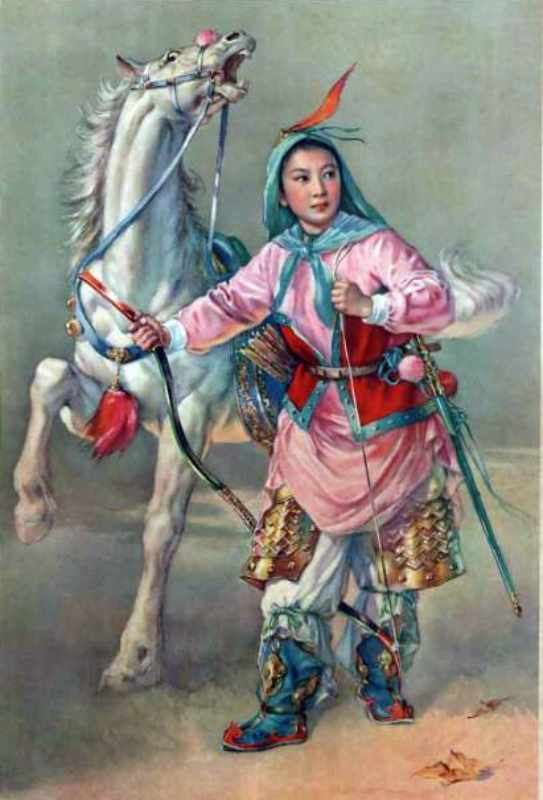Hua Mulan (traditional Chinese: 花木蘭; simplified Chinese: 花木兰) is a legendary folk heroine from the Northern and Southern dynasties era (4th to 6th century CE) of Chinese history. According to legend, Mulan took her aged father’s place in the conscription for the army by disguising herself as a man. In the story, after prolonged and distinguished military service against nomadic hordes beyond the northern frontier, Mulan is honored by the emperor but declines a position of high office. She retires to her hometown, where she is reunited with her family and reveals her gender, much to the astonishment of her comrades. Scholars generally consider Mulan to be a fictional character. Hua Mulan is depicted in the Wu Shuang Pu (無雙譜, Table of Peerless Heroes) by Jin Guliang. The first written record of Mulan is the Ballad of Mulan, a folk song believed to have been composed during the Northern Wei dynasty (386–535 CE) and compiled in an anthology of books and songs during the Southern Chen dynasty (557–589 CE). The historical setting of the Ballad of Mulan is usually the Northern Wei’s military campaigns against the nomadic Rouran. A later adaptation has Mulan active around the founding of the Tang dynasty (c. 620 CE). The story of Mulan was taken up in a number of later works, including the 16th-century historical fiction Romance of Sui and Tang, and many screen and stage adaptations.
| Alias Mulan |
| Real Names/Alt Names Hua Mulan |
| Characteristics Martial Artist, Literary Characters, Medieval Age, Public Domain |
| Creators/Key Contributors Unknown |
| First Appearance The Ballad of Mulan (6th Century) |
| First Publisher ○ |
| Appearance List Ballads and Literature: Ballad of Mulan (Northern Wei dynasty, 386–535 CE, 557–589 CE), Wu Shuang Pu (無雙譜, Table of Peerless Heroes) by Jin Guliang (1694), Romance of Sui and Tang (16th century). Stage: Mulan Joins the Army (1917). Film: Hua Mulan Joins the Army (1927), Mulan Joins the Army (1928), Mulan Joins the Army (1939). |
| Sample Read The Ballad of Mulan [Wikisource] |
| Description Hua Mulan (traditional Chinese: 花木蘭; simplified Chinese: 花木兰) is a legendary folk heroine from the Northern and Southern dynasties era (4th to 6th century CE) of Chinese history. According to legend, Mulan took her aged father’s place in the conscription for the army by disguising herself as a man. In the story, after prolonged and distinguished military service against nomadic hordes beyond the northern frontier, Mulan is honored by the emperor but declines a position of high office. She retires to her hometown, where she is reunited with her family and reveals her gender, much to the astonishment of her comrades. Scholars generally consider Mulan to be a fictional character. Hua Mulan is depicted in the Wu Shuang Pu (無雙譜, Table of Peerless Heroes) by Jin Guliang. The first written record of Mulan is the Ballad of Mulan, a folk song believed to have been composed during the Northern Wei dynasty (386–535 CE) and compiled in an anthology of books and songs during the Southern Chen dynasty (557–589 CE). The historical setting of the Ballad of Mulan is usually the Northern Wei’s military campaigns against the nomadic Rouran. A later adaptation has Mulan active around the founding of the Tang dynasty (c. 620 CE). The story of Mulan was taken up in a number of later works, including the 16th-century historical fiction Romance of Sui and Tang, and many screen and stage adaptations. |
| Source Hua Mulan – Wikipedia |

